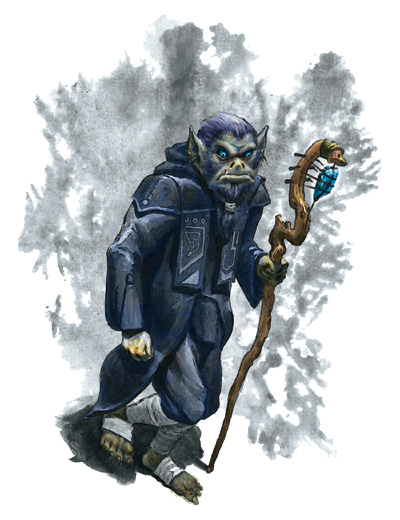Scribe
Legend
25 class-fantasy ideas
That seems to be a lot. Subclasses become Classes?
25 class-fantasy ideas

Already made my Level Up version. It's a heritage gift.
A goblin subspecies that definitely needs to be brought back for 5e.
Well, 13 of them already exist, Artificer + 12 PHB classes.That seems to be a lot. Subclasses become Classes?
This is the point I keep getting at. Why would they like it? In particular, why would WotCs core demographic - teens - like it? What does it have that makes it cool and interesting?If they like it, why wouldn't they buy it? People buy things that they like.
People like psionics. I liked a number of WotC's incarnations. As did a lot of the folks in various psionics threads that I asked about it. If they had asked the proper questions, we would likely have a psion now.This is the point I keep getting at. Why would they like it? In particular, why would WotCs core demographic - teens - like it? What does it have that makes it cool and interesting?
What people? People who were 1 year old last time psionics was part of D&D? I don't think so. The word has lost any meaning. Star Wars has space magic. Dune has space magic. Mass Effect has space magic. But no one uses the word "psionics". It's a relic of the 70s. "Psychic" at least retains some meaning.People like psionics.
Fighting and wizarding are all over children's fiction, and even more so in the video games they play. Some have clerics(priests) too, but it's losing traction a bit. If you were to come up with something modelled on a currently popular video game, then you might have something that "people" - the people you want to sell to - like.As for being cool to teens, it's just as cool as fighting, clericing or wizarding. Mental powers are cool and interesting in and of themselves.
It's the same difference. Star Wars space magic = psionics. Dune space magic = psionics. Stranger Things 11 = psionics. Teens aren't stupid. They will be able to see that psionics is mental magic like Star Wars, Stranger Things, and Dune.........................and think it's cool. Hell, even if they didn't see any mind magic, the book offering up something cool like that would interest people.What people? People who were 1 year old last time psionics was part of D&D? I don't think so. The word has lost any meaning. Star Wars has space magic. Dune has space magic. Mass Effect has space magic. But no one uses the word "psionics". It's a relic of the 70s. "Psychic" at least retains some meaning.
it as a concept if not by name still stands it can be reborn as soon as we have substance to it, it needs definition in areas and to be made cool that is all it takes.What people? People who were 1 year old last time psionics was part of D&D? I don't think so. The word has lost any meaning. Star Wars has space magic. Dune has space magic. Mass Effect has space magic. But no one uses the word "psionics". It's a relic of the 70s. "Psychic" at least retains some meaning.
Fighting and wizarding are all over children's fiction, and even more so in the video games they play. Some have clerics(priests) too, but it's losing traction a bit. If you were to come up with something modelled on a currently popular video game, then you might have something that "people" - the people you want to sell to - like.
It's the same difference
Which is my point. You cannot just stick the word “psionics” on the cover and expect people to know what its about. It needs to be EXPLAINED. Which means you need to stop being so effing woolly about it.it as a concept if not by name
